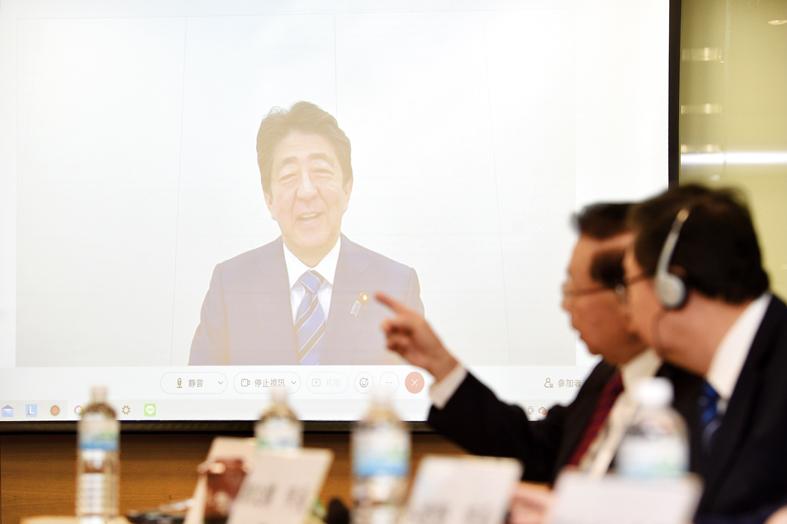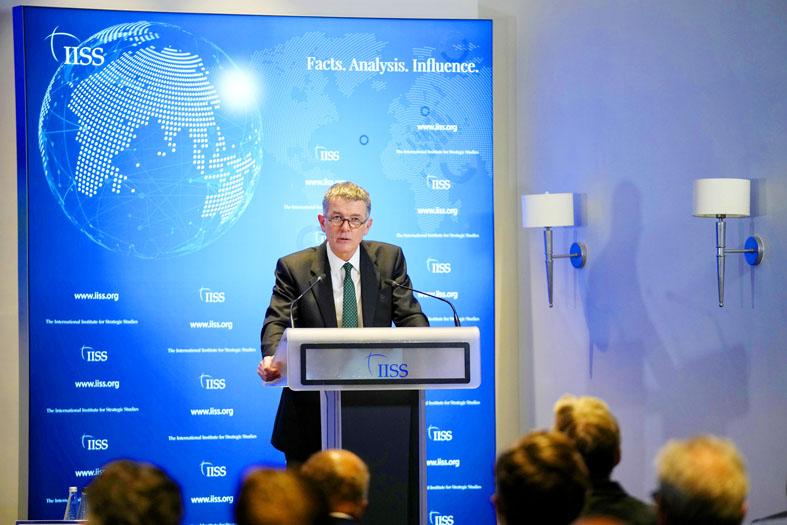Japan and the US could not stand by if China attacked Taiwan, and Beijing needs to understand this, former Japanese prime minister Shinzo Abe said yesterday.
Speaking virtually to a forum organized by Taiwanese think tank the Institute for National Policy Research, Abe said that the Senkaku Islands — known as the Diaoyutai Islands (釣魚台) in Taiwan — the Sakishima Islands and Yonaguni Island are only about 100km from Taiwan.
An invasion of Taiwan would be a grave danger to Japan, he said.

Photo: Peter Lo, Taipei Times
“A Taiwan emergency is a Japanese emergency, and therefore an emergency for the Japan-US alliance. People in Beijing, [Chinese] President Xi Jinping (習近平) in particular, should never have a misunderstanding in recognizing this,” Abe said.
Abe called on the democratic world to prevent a Chinese invasion by standing together and jointly urging Xi and the Chinese Communist Party “not to choose the wrong path.”
“A stronger Taiwan, a thriving Taiwan, and a Taiwan that guarantees freedom and human rights are also in Japan’s interests. Of course, this is also in the interest of the whole world,” Abe said.

Photo: AP
A military action targeting Taiwan would also lead to “economic suicide” for China, despite it being one of the world’s top economies, and significantly affect the global economy given China’s close economic and trade ties with the rest of the world, he added.
That is why maintaining peace across the Taiwan Strait is in the interest of all parties involved, he said.
Abe reiterated his support for Taiwan’s bid to join the Tokyo-led international trade bloc, the Comprehensive and Progressive Agreement for Trans-Pacific Partnership (CPTPP).
During his tenure as prime minister, Abe said he tried to expand Japan’s strategic economic, security and diplomatic standing in the world order, and saw the need to “firmly connect ourselves to a free and open democratic framework.”
“Based on the same idea, I support Taiwan’s participation in the TPP,” he said, using the CPTPP’s former name, the Trans-Pacific Partnership, to refer to the trade bloc.
“The role of the TPP in maintaining and strengthening the rules-based international order is important. Taiwan is more than qualified to participate,” he said.
On Tuesday in London, British Secret Intelligence Service Chief Richard Moore told an event organized by the International Institute for Strategic Studies: “The Chinese Communist Party leadership increasingly favors bold and decisive action on national security grounds. The days of [former Chinese leader] Deng Xiaoping’s (鄧小平) ‘hide your strength, bide your time’ are over.”
“Beijing believes its own propaganda about Western frailties and underestimates Washington’s resolve. The risk of Chinese miscalculation through overconfidence is real,” Moore said, without mentioning Taiwan explicitly.
The MI6 head warned about the spread of Chinese surveillance technology, which he said was used in “targeting the Uighur population in Xinjiang,” and said the UK needed to recognize that “technologies of control are being increasingly exported to other governments.”
Moore said that “adapting to a world affected by the rise of China is the single-biggest priority for MI6.”
Additional reporting by the Guardian

The CIA has a message for Chinese government officials worried about their place in Chinese President Xi Jinping’s (習近平) government: Come work with us. The agency released two Mandarin-language videos on social media on Thursday inviting disgruntled officials to contact the CIA. The recruitment videos posted on YouTube and X racked up more than 5 million views combined in their first day. The outreach comes as CIA Director John Ratcliffe has vowed to boost the agency’s use of intelligence from human sources and its focus on China, which has recently targeted US officials with its own espionage operations. The videos are “aimed at

STEADFAST FRIEND: The bills encourage increased Taiwan-US engagement and address China’s distortion of UN Resolution 2758 to isolate Taiwan internationally The Presidential Office yesterday thanked the US House of Representatives for unanimously passing two Taiwan-related bills highlighting its solid support for Taiwan’s democracy and global participation, and for deepening bilateral relations. One of the bills, the Taiwan Assurance Implementation Act, requires the US Department of State to periodically review its guidelines for engagement with Taiwan, and report to the US Congress on the guidelines and plans to lift self-imposed limitations on US-Taiwan engagement. The other bill is the Taiwan International Solidarity Act, which clarifies that UN Resolution 2758 does not address the issue of the representation of Taiwan or its people in

US Indo-Pacific Commander Admiral Samuel Paparo on Friday expressed concern over the rate at which China is diversifying its military exercises, the Financial Times (FT) reported on Saturday. “The rates of change on the depth and breadth of their exercises is the one non-linear effect that I’ve seen in the last year that wakes me up at night or keeps me up at night,” Paparo was quoted by FT as saying while attending the annual Sedona Forum at the McCain Institute in Arizona. Paparo also expressed concern over the speed with which China was expanding its military. While the US

SHIFT: Taiwan’s better-than-expected first-quarter GDP and signs of weakness in the US have driven global capital back to emerging markets, the central bank head said The central bank yesterday blamed market speculation for the steep rise in the local currency, and urged exporters and financial institutions to stay calm and stop panic sell-offs to avoid hurting their own profitability. The nation’s top monetary policymaker said that it would step in, if necessary, to maintain order and stability in the foreign exchange market. The remarks came as the NT dollar yesterday closed up NT$0.919 to NT$30.145 against the US dollar in Taipei trading, after rising as high as NT$29.59 in intraday trading. The local currency has surged 5.85 percent against the greenback over the past two sessions, central